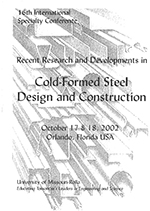Session Dates
17 Oct 2002
Abstract
The Direct Strength method is a new design procedure for cold-formed steel members. The method employs elastic buckling solutions for the cross-section, instead of the element-by-element plate buckling solutions used in traditional design. The use of cross-section elastic buckling solutions insures inter-element compatibility and equilibrium. The Direct Strength method uses strength formulas on the gross section, similar to conventional column curves, for capacity prediction in local and distortional buckling. This avoids effective section calculations altogether. The reliability of the Direct Strength method is demonstrated for a broad selection of beams and columns by comparison with existing test data. Extension of the method to beam-columns is discussed and a solution proposed and demonstrated. Areas needing further research for final implementation are highlighted. The Appendix to the paper provides detailed "specification style" language appropriate for employing the Direct Strength method for the design of beams and columns.
Department(s)
Civil, Architectural and Environmental Engineering
Research Center/Lab(s)
Wei-Wen Yu Center for Cold-Formed Steel Structures
Meeting Name
16th International Specialty Conference on Cold-Formed Steel Structures
Publisher
University of Missouri--Rolla
Document Version
Final Version
Rights
© 2002 University of Missouri--Rolla, All rights reserved.
Document Type
Article - Conference proceedings
File Type
text
Language
English
Recommended Citation
Schager, Benjamin W., "Progress on the Direct Strength Method" (2002). CCFSS Proceedings of International Specialty Conference on Cold-Formed Steel Structures (1971 - 2018). 2.
https://scholarsmine.mst.edu/isccss/16iccfss/16iccfss-session9/2
Progress on the Direct Strength Method
The Direct Strength method is a new design procedure for cold-formed steel members. The method employs elastic buckling solutions for the cross-section, instead of the element-by-element plate buckling solutions used in traditional design. The use of cross-section elastic buckling solutions insures inter-element compatibility and equilibrium. The Direct Strength method uses strength formulas on the gross section, similar to conventional column curves, for capacity prediction in local and distortional buckling. This avoids effective section calculations altogether. The reliability of the Direct Strength method is demonstrated for a broad selection of beams and columns by comparison with existing test data. Extension of the method to beam-columns is discussed and a solution proposed and demonstrated. Areas needing further research for final implementation are highlighted. The Appendix to the paper provides detailed "specification style" language appropriate for employing the Direct Strength method for the design of beams and columns.



